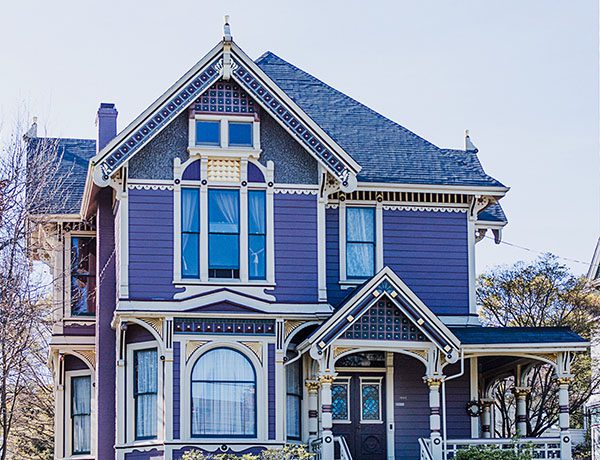
Getting A Bigger Home, Expand or Buy?
Getting a Bigger House
When Erin Nutter and her husband, Eric, bought their first house in 2009, they knew it wasn’t their forever home.
While the three-bedroom ranch in Mentor, Ohio, met their needs, they knew it wouldn’t accommodate a growing family. “We knew kids were in the future,” Nutter, 35, said.
 So in 2013, the couple started to think about getting a bigger home, but they weren’t certain whether they wanted to buy a larger house or expand the one they already had.
So in 2013, the couple started to think about getting a bigger home, but they weren’t certain whether they wanted to buy a larger house or expand the one they already had.
The couple, who run a do-it-yourself blog called The DIY Nuts, had put so much work into their home, and they loved their neighborhood. So, finding a new location was not a huge priority.
Yet, the housing market at the time was good for buyers, Nutter said, and mortgage rates were low.
The deciding factor for the couple came down to logistics.
The lot size would not allow them to expand outward, and the only way to add on would have been to create a second story.
“Financially, this really would not have made sense for us,” Nutter said.
Ultimately, they decided to buy a bigger house 4 miles away from their first home/“
We went from three bedrooms to five, and now that we have three children, that was a very good move,” she said.
An evolving need for space
For some families, more space is a necessity. Some, like the Nutters, need additional bedrooms for growing families. Others may need to bring aging parents to live with them or welcome adult children into the fold. The pandemic has given some working Americans a new reason to want a bigger house: adequate office space.
Among remote workers planning to make changes to their home workspace, more than half – 58% – considered moving to a larger home, according to a 2020 survey by real estate blog CommercialCafe.
Once you decide you need a bigger house, you must determine the best way to accomplish your goal. If you’re torn between trading up and renovating your current home, experts offer some factors to consider.
You Might Also Like: You’ve Probably Never Cleaned This Part of Your Shower
► Know your “why.”
Examine your reasons for wanting more space. Do you need additional bedrooms? Is your storage room overflowing? When you answer those questions, you may realize that one option makes more sense than another. For example, if you need more space for a growing family and your current house is not in a good school district, it may make sense to buy in a neighborhood with better schools.
► Assess your current location.
Does your current location meet your needs? Are you spending a lot of money on gas and transportation costs because you live far away from work? The pandemic also could make a move to a less expensive area possible because some companies have given employees more remote working options.
“If you’re living in a prime location that used to be necessary for your commute, but now you could move 10 miles farther away and have a mortgage payment that’s half (what you currently pay), it’s time to buy a bigger house,” said Lesley Siegel, a Southern California real estate agent.
► Look at your finances.
A bigger house is likely to come with a bigger mortgage, higher taxes and costlier utility bills. Then there’s the cost of maintenance, and because you’re moving, you may want to throw new furniture into the mix.
Not only should you make sure you’re financially prepared to do all of that, but you should assess whether you are in a good position to apply for a mortgage, said Christopher Brown, a broker with NEXT Real Estate Group in Roseville, California. If your credit score recently took a turn for the worse or your income dropped, it could be difficult to qualify for a low-interest rate for a mortgage, Brown said.
► Expanding your current home comes at a cost.
According to HomeAdvisor, housing additions run, on average, between $80 to $200 per square foot, with a majority of homeowners reporting that they spent between $20,637 and $72,182 to make additions to their homes. Also, determine whether you will have to find somewhere else to live temporarily during the remodel, said Siegel. If so, that could be another cost. If you have a lot of equity and you don’t want to move, you might pay for the expansion by doing a cash-out refinance or taking out a home equity loan.
Consider the market
Ask yourself if this is a good time to buy.
Judge the current real estate market by consulting with a trusted local real estate agent, says Dawn Templeton, co-owner and broker at Templeton Real Estate Group in Boise, Idaho. This will help you determine whether buying a new house right now would be profitable. The current market “is hotter than ever, and the sellers have the upper hand,” she said. That means you could end up in a bidding war that has you paying 20% to 30% more than the asking price, she added. Judge the current real estate market by consulting with a trusted local real estate agent, says Dawn Templeton, co-owner and broker at Templeton Real Estate Group in Boise, Idaho.
Evaluate your need for outdoor space
If you’re looking to add onto your home, that extra square footage will have to come from somewhere, likely your backyard said Brown. “If you’re sitting on a huge lot and won’t miss the space, it could make sense to expand and stay put, but if you have a smaller yard and your family spends a lot of time outdoors, you may not want to cut out a huge chunk of land by putting more house on it,” Brown added.
When it comes to expanding your living conditions, there is no one-size-fits-all solution since so many variables are at play, says Siegel. “At the end of the day it’s a personal decision,” Siegal said.
Betty Most Agency


